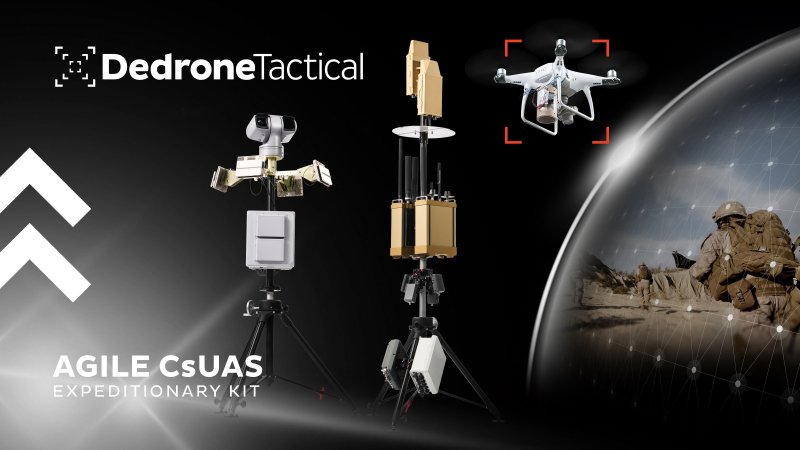For counterdrone companies like Dedrone, business is incredibly good. In fact, today the anti-drone company reported 300% revenue growth year-over-year.
Dedrone calls itself a ‘smart airspace security company. The company, which is headquartered in Washington, D.C., makes a variety of hardware and software products intended to help customers detect, track, identify, analyze, and mitigate drone threats.
You’re paying for counterdrone companies like Dedrone, in a way
Why is business so good for counterdrone companies, like Dedrone? A good chunk of the money used to grow counterdrone companies like Dedrone comes from your tax dollars. That’s because a large share of Dedrone customers are government agencies.
In fact, Dedrone says it closed 16 new government contractors globally over the past year. Among those include deals with the U.S. Department of Defense. Dedrone is working with multiple DoD organizations, including the Department of Defense’s (DoD) Defense Innovation Unit (DIU), which is an organization under the U.S. Department of Defense designed to help the U.S. military make faster use of emerging commercial technologies.
Dedrone is used by five of the G-7 nation governments. It’s used by 14 separate U.S. federal entities, as well as 20 other non-U.S. governments. In the U.S., that includes the Federal Aviation Administration. They’re working on a test project across a few U.S. airports where it’ll use Dedrone’s detection, tracking, identification and mitigation products, to conduct research about general airport counterdrone operations.
Dedrone is big — and it’s growing
Dedrone builds software that relies on artificial intelligence (AI) and machine learning (ML). Used in tandem with the companies modular hardware, Dedrone has built a sort of all-in-one product that allows customers to rapidly deploy drones and respond to rapidly changing situations. You’ll find its products everywhere from airports to stadiums to critical security sites.
In leaning into the government side of things, Dedrone has increased its focus on deepening its relationships with defense departments around the world.
To further those efforts, Dedrone has even made its own Defense Advisory Board. Inaugural members include General Richard D. Clarke (US Army, retired) and former Acquisition Executive for United States Special Operations Command (USSOCOM) James Smith. The company also brought on Brigadier General James Bienlien (US Army, retired) as Vice President of Defense.
Additionally, Dedrone recently became a member of the Global Special Operations Forces (GSOF) Foundation, a foundation connecting public and private stakeholders in SOF activities worldwide.
And even today, Dedrone continues to roll out new products. For example, Dedrone recently launched a software product called Dedrone City-Wide Drone Detection, which won a spot on The Time Best Inventions of 2023 list. Customers include Con Edison and Barcelona’s police force.
Why interest in counterdrone companies has surged
As more small, off-the-shelf drones are used in warfare, there comes a need for counterdrone capabilities. Among the key, military-focused counterdrone products made by Dedrone is what’s called DedroneTactical. The portable, plug-and-play kit leverages Dedrone’s autonomous, AI-driven command and control (C2) platform called DedroneTracker.ai, and it puts it into what Dedrone refers to as “an end-to-end CsUAS kill chain.”
“Drones now play a crucial role in every modern conflict, and the war in Ukraine has shown that fast development cycles are key to a strong defense,” said Rob Campbell, General Manager of Dedrone Defense.
Drones used in Ukraine include everything from ready-to-fly camera drones to more robust drones from major military drone makers. That includes Teal, which has supplied more than a Golden Eagle drones to Ukrainian armed forces, and a purchase order of hundreds of undisclosed drones last summer.
As for Dedrone? It’s tech has been used in the war in Ukraine by providing AI-enabled products to Ukrainian fighters. Those products are being used to build models via machine learning. In fact, in an effort to be as close as possible to developments in Ukraine, Dedrone recently opened an office in Denmark. There, Dedrone says it’s testing high-end sensors and threat simulation capabilities. Dedrone is also one of 15 inaugural signatories of what’s called the Ukraine Defence Industry Compact. That compact is a group of companies working to provide Ukraine with a variety of defense technology.
“As we’ve seen recently in conflicts in Ukraine and in the Middle East, the threat of drones is real, and it is here to stay,” said Gen. Clarke. “The need to quickly respond to changing capabilities and developments requires nations around the world to look for partners capable of handling the rapid pace of innovation.”

